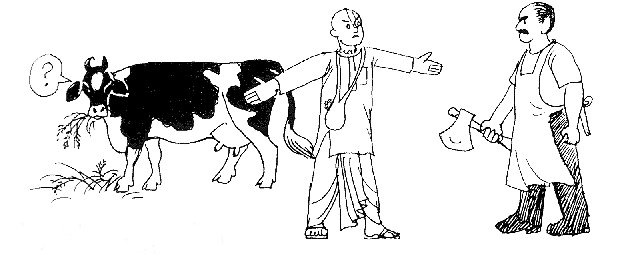What Should We Make of India's Cow Protection Movement?
"[O]n April 21, 2017, in the Jammu region of Jammu and Kashmir state, a mob brutally attacked five members of a nomad cattle-herding family, including a 9-year-old girl, on suspicion that they were taking their cows for slaughter. A video posted on social media showed a group of men chanting slogans commonly used by BJP supporters, breaking down the family’s shelter, beating an elderly man with rods and sticks even as women begged for mercy, and finally setting the shelter on fire."
This episode is the latest in a trend sweeping India of "cow protection" that has won praise and accolades from some animal advocates, from up and down my newsfeed, and from Leonardo DiCaprio. The tide has swept high enough that India recently banned the sale of cows for slaughter. It's now reached the point at which the movement turns to violence, high on its own success.
What should animal rights activists make of this movement? The turn to violence is something to oppose given studies on 60s urban riots, French labor movements, and civil resistance more broadly. The campaign also deserves condemnation as an instance of Hindu nationalism and anti-Muslim bigotry (not all that different from the alliance between some European animal advocates and anti-Muslim forces).
What should we make, though, of the campaign's impact on animals, as well as campaigns to, say, tax cow flesh because of its impact on climate change?
Many animal advocates are inclined to praise such achievements as incremental changes that lead down the path to protection for all animals. I think this view is flawed. While I'm inclined to look at the path of history as bending toward justice, that does not mean that any policy change necessarily does so. To know whether a policy change will have the right effect, we should think of the way it affects political forces at play in shaping policy.
In this sense, "cow protection" has a few effects relevant to animals:
1) It satisfies the forces pushing for cow protection or a cow flesh ban. In India's case, this is primarily Hindus, although American environmentalists have provided support as well. By satisfying these forces, those forces will be less willing to advocate for a broader policy that includes the goal of banning cow flesh in the future.
(In India's case that may not be this concerning, as an alliance with Islamophobic nationalists is probably not an appropriate move for animal advocates, but with environmentalists this should be a serious concern.)
(In India's case that may not be this concerning, as an alliance with Islamophobic nationalists is probably not an appropriate move for animal advocates, but with environmentalists this should be a serious concern.)
2) It sets a cultural signal - although this could go both ways. It says that banning animal products acceptable, which can make other bans more plausible, but it also says that cows are a particularly bad animal to exploit, which actually goes against what we should do based on the sheer numbers of animals exploited.
3) It leads to people eating fewer or no cows and eating chickens, fishes, and pigs instead. Given that a "serving" of chicken, fish, or pig flesh contains far more suffering than a serving of cow flesh, this means more suffering and death by more animals. Perhaps because of environmentalist arguments against eating cows, American cow consumption seems far more troubled than American chicken consumption.
By my assessment, the longer-term picture is bleak, although slightly ambiguous, and the short-term picture is less ambiguously bad. Given that, animal advocates should not support the cow protection movement.
3) It leads to people eating fewer or no cows and eating chickens, fishes, and pigs instead. Given that a "serving" of chicken, fish, or pig flesh contains far more suffering than a serving of cow flesh, this means more suffering and death by more animals. Perhaps because of environmentalist arguments against eating cows, American cow consumption seems far more troubled than American chicken consumption.
By my assessment, the longer-term picture is bleak, although slightly ambiguous, and the short-term picture is less ambiguously bad. Given that, animal advocates should not support the cow protection movement.



Nice post. :) I probably agree with not blanketly endorsing the movement, though one can write more detailed articles (like this one) describing the pros and cons.
ReplyDelete> By satisfying these forces, those forces will be less willing to advocate for a broader policy that includes the goal of banning cow flesh in the future.
Alternatively, by seeing a victory, activists might be encouraged to keep going with further campaigns.
Thanks! Means a lot to hear you liking this post given how much I respect your writing.
DeleteMy point on satisfying the anti-beef forces was that I think once they win this campaign there will be no further campaign for them. That is, they won't support a chicken flesh ban, whereas if the chicken flesh ban were included in the beef ban, they could be marshaled to support it.
Fair enough! I guess I would think that changing the cow ban into a cow+chicken ban now would be as unlikely as getting a chicken ban later (i.e., both are probably not going to happen).
Delete> Means a lot to hear you liking this post
:)